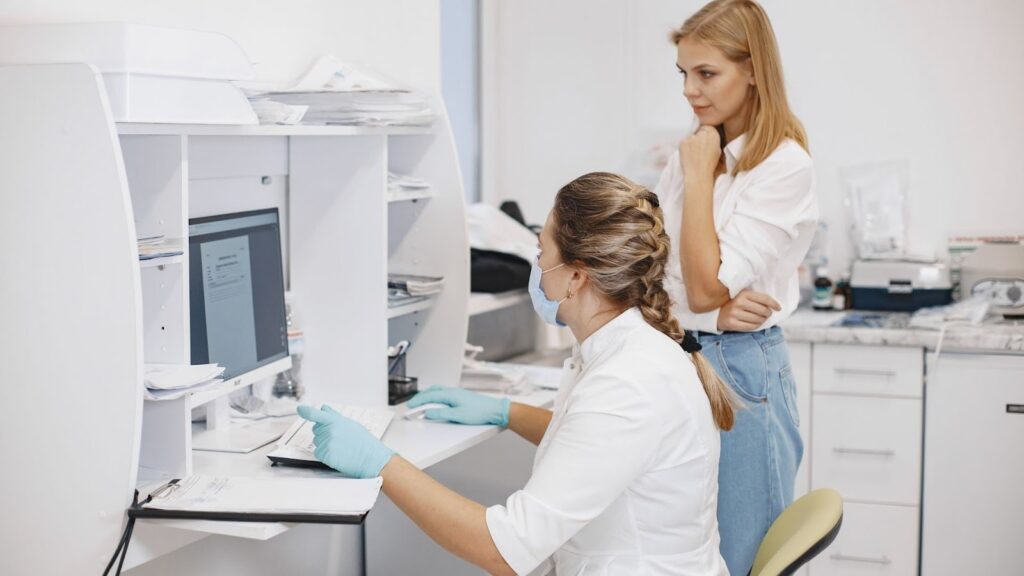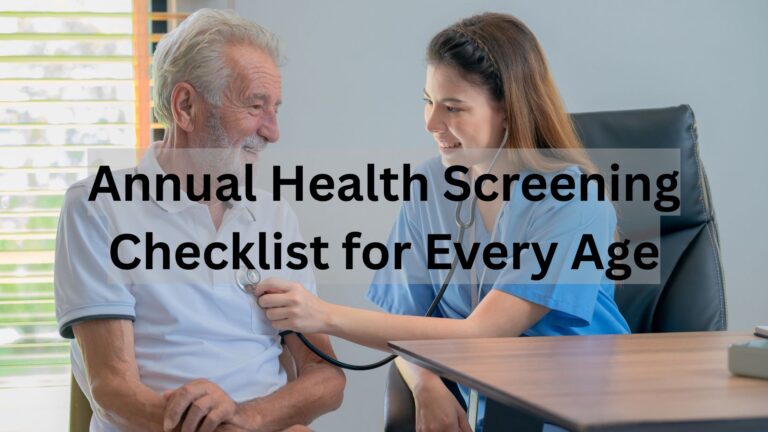Preventive health is the cornerstone of a long, vibrant life. While many people only visit a doctor when they feel unwell, regular annual health screenings can detect potential health issues early, long before they develop into serious illnesses. By following a structured health screening checklist, you can take control of your well-being, reduce the risk of chronic diseases, and maintain optimal health at every stage of life.
In this comprehensive guide, we’ll break down the essential health screenings by age group, provide practical tips, and explain why these preventive measures are crucial for lifelong wellness.
Why Annual Health Screenings Matter
Annual health screenings are more than just routine check-ups. They help you:
- Detecting diseases early: Conditions like diabetes, high blood pressure, and cancer are easier to treat when caught early.
- Monitor vital signs and risk factors: Regular screenings track blood pressure, cholesterol, and glucose levels.
- Prevent long-term complications: Early interventions reduce the risk of heart disease, stroke, and other chronic illnesses.
- Promote overall wellness: Health screenings encourage a proactive approach to mental and physical well-being.
Healthcare experts recommend that adults of all ages create a personalized screening schedule, tailored to their family history, lifestyle, and existing medical conditions.

Health Screening Checklist: Age 20-29
While younger adults often feel invincible, preventive health is crucial even in your 20s. Early detection sets the stage for a lifetime of wellness.
Key Screenings for Your 20s
- Blood Pressure Check:
- Frequency: At least once every 2 years.
- Why: Hypertension often develops silently.
- Frequency: At least once every 2 years.
- Cholesterol Test:
- Frequency: Once in your 20s, then as recommended.
- Why: Early identification of high cholesterol helps prevent heart disease.
- Frequency: Once in your 20s, then as recommended.
- Body Mass Index (BMI) and Weight Assessment:
- Frequency: Annually.
- Why: Maintains healthy weight and reduces risk of metabolic disorders.
- Frequency: Annually.
- STI Screening:
- Frequency: Annually or as needed based on sexual activity.
- Why: Early detection protects long-term reproductive health.
- Frequency: Annually or as needed based on sexual activity.
- Pap Smear (for women):
- Frequency: Every 3 years (ages 21-29).
- Why: Detects cervical abnormalities before they become cancerous.
- Frequency: Every 3 years (ages 21-29).
- Vaccinations:
- Tdap booster, flu shot, HPV vaccination, and others as recommended.
- Tdap booster, flu shot, HPV vaccination, and others as recommended.
Pro Tip: Establish a primary care provider in your 20s to build a health history and track screenings effectively.

Health Screening Checklist: Age 30-39
As metabolism slows and lifestyle changes take place, the 30s are the perfect time to focus on preventing chronic diseases.
Essential Screenings for Your 30s
- Blood Pressure and Cholesterol:
- Frequency: Every 1-2 years.
- Why: Early detection of hypertension and high cholesterol reduces cardiovascular risk.
- Frequency: Every 1-2 years.
- Blood Glucose Test:
- Frequency: Every 3 years, or more often if overweight or with a family history of diabetes.
- Frequency: Every 3 years, or more often if overweight or with a family history of diabetes.
- BMI and Waist Circumference:
- Frequency: Annually.
- Why: Visceral fat can indicate metabolic syndrome risk.
- Frequency: Annually.
- Cervical Cancer Screening (for women):
- Frequency: Pap smear every 3 years; consider HPV testing after 30.
- Frequency: Pap smear every 3 years; consider HPV testing after 30.
- Breast Examination (for women):
- Frequency: Clinical breast exam every 1-3 years; self-exams monthly.
- Frequency: Clinical breast exam every 1-3 years; self-exams monthly.
- Skin Check:
- Frequency: Annually or more if prone to sun exposure or skin cancer.
- Frequency: Annually or more if prone to sun exposure or skin cancer.
- Vision and Hearing Test:
- Frequency: Every 2-3 years, or sooner if changes occur.
- Frequency: Every 2-3 years, or sooner if changes occur.
Lifestyle Tip: Maintain a balanced diet, exercise regularly, and reduce stress to support overall health and wellness.

Health Screening Checklist: Age 40-49
The 40s are a pivotal decade where preventive screenings can identify hidden conditions that may lead to chronic diseases.
Crucial Screenings for Your 40s
- Blood Pressure:
- Frequency: Annually.
- Frequency: Annually.
- Cholesterol and Lipid Panel:
- Frequency: Every 4-6 years or more frequently based on risk factors.
- Frequency: Every 4-6 years or more frequently based on risk factors.
- Blood Glucose or A1C Test:
- Frequency: Every 3 years; more frequently for high-risk individuals.
- Frequency: Every 3 years; more frequently for high-risk individuals.
- Colorectal Cancer Screening:
- Frequency: Begin at age 45 with colonoscopy, stool-based tests, or other recommended methods.
- Frequency: Begin at age 45 with colonoscopy, stool-based tests, or other recommended methods.
- Mammogram (for women):
- Frequency: Every 1-2 years starting at 40, based on physician recommendation.
- Frequency: Every 1-2 years starting at 40, based on physician recommendation.
- Pap Smear and Pelvic Exam (for women):
- Frequency: Every 3 years, with HPV co-testing if appropriate.
- Frequency: Every 3 years, with HPV co-testing if appropriate.
- Prostate Exam (for men):
- Frequency: Discuss with your doctor starting at 45.
- Frequency: Discuss with your doctor starting at 45.
- Eye and Dental Exams:
- Frequency: Eye exam every 1-2 years, dental every 6 months.
- Frequency: Eye exam every 1-2 years, dental every 6 months.
Preventive Tip: Consider lifestyle changes such as reducing alcohol, quitting smoking, and maintaining a healthy weight to lower disease risk.

Health Screening Checklist: Age 50-59
The 50s are a critical period for cancer screenings and cardiovascular health checks. Early detection during this decade can save lives.
Must-Do Screenings for Your 50s
- Blood Pressure and Cholesterol:
- Frequency: Annually for blood pressure, every 4-6 years for cholesterol.
- Frequency: Annually for blood pressure, every 4-6 years for cholesterol.
- Blood Glucose or A1C:
- Frequency: Every 3 years; more frequently if prediabetic or high-risk.
- Frequency: Every 3 years; more frequently if prediabetic or high-risk.
- Colorectal Cancer Screening:
- Frequency: Colonoscopy every 10 years, or alternative tests per physician guidance.
- Frequency: Colonoscopy every 10 years, or alternative tests per physician guidance.
- Breast Cancer Screening (for women):
- Frequency: Mammogram every 1-2 years.
- Frequency: Mammogram every 1-2 years.
- Cervical Cancer Screening (for women):
- Frequency: Continue until age 65 if results are normal.
- Frequency: Continue until age 65 if results are normal.
- Prostate Cancer Screening (for men):
- Frequency: PSA test discussion with your doctor.
- Frequency: PSA test discussion with your doctor.
- Bone Density Test (for women and men at risk):
- Frequency: Typically at age 50 for women, 70 for men unless risk factors exist.
- Frequency: Typically at age 50 for women, 70 for men unless risk factors exist.
- Vision, Hearing, and Dental Exams:
- Frequency: Eye exam annually; dental every 6 months; hearing test as needed.
- Frequency: Eye exam annually; dental every 6 months; hearing test as needed.
Health Tip: Begin discussions about hormone changes, menopause, or testosterone levels with your healthcare provider.

Health Screening Checklist: Age 60 and Above
After 60, preventive screenings become essential to detect age-related diseases, maintain independence, and ensure quality of life.
Vital Screenings for Seniors
- Blood Pressure, Cholesterol, and Blood Glucose:
- Frequency: Annually or as recommended.
- Frequency: Annually or as recommended.
- Colorectal Cancer Screening:
- Frequency: Continue if in good health, based on prior results and physician advice.
- Frequency: Continue if in good health, based on prior results and physician advice.
- Breast Cancer Screening (for women):
- Frequency: Mammogram every 1-2 years if life expectancy is sufficient.
- Frequency: Mammogram every 1-2 years if life expectancy is sufficient.
- Prostate Cancer Screening (for men):
- Frequency: PSA testing based on discussion with a physician.
- Frequency: PSA testing based on discussion with a physician.
- Bone Density Screening:
- Frequency: Every 2 years for women; men at risk should discuss with their doctor.
- Frequency: Every 2 years for women; men at risk should discuss with their doctor.
- Eye Exams for Cataracts and Glaucoma:
- Frequency: Annually.
- Frequency: Annually.
- Hearing Test:
- Frequency: Every 1-2 years.
- Frequency: Every 1-2 years.
- Vaccinations:
- Annual flu shot, shingles vaccine, pneumococcal vaccines, and COVID-19 boosters as recommended.
- Annual flu shot, shingles vaccine, pneumococcal vaccines, and COVID-19 boosters as recommended.
- Cognitive and Mental Health Assessments:
- Frequency: Annually; monitor for memory loss, depression, or anxiety.
- Frequency: Annually; monitor for memory loss, depression, or anxiety.
Lifestyle Tip: Stay physically active, maintain social connections, and eat a nutrient-dense diet to support longevity and brain health.
Practical Tips to Maximize Your Health Screenings
- Keep a Health Journal: Track your screenings, test results, and vaccination history.
- Schedule in Advance: Book annual appointments at the same time each year to stay consistent.
- Bring Questions: Prepare a list of concerns, symptoms, or family history updates.
- Follow Up: Review results with your healthcare provider and implement recommended lifestyle changes.
- Insurance Check: Verify coverage for preventive screenings to avoid unexpected costs.
Pro Tip: Combine screenings with annual physicals for convenience and comprehensive evaluation.
Conclusion: Take Charge of Your Health Today
Annual health screenings are an investment in your future well-being. They help you stay ahead of illness, detect potential problems early, and maintain a healthy, vibrant life. By following a structured health screening checklist for every age, you can make informed decisions, reduce the risk of chronic diseases, and enjoy peace of mind knowing that your health is being monitored proactively.
Start today: schedule your next check-up, review your family health history, and take the first step toward lifelong wellness. Your future self will thank you.


